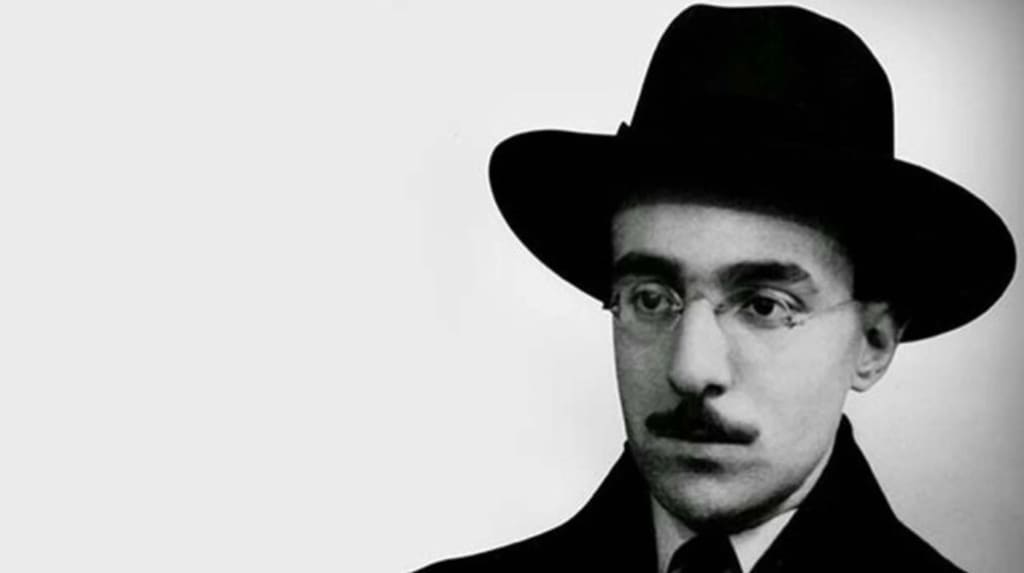Terrible Paradox of Self-Awareness
Self-Awareness

Sometimes the background to a piece of art is just as interesting as the finished product. Sometimes a piece's content's origin influences it. The narrative of 20th-century author Fernando Pessoa as well as his masterpiece, the Book of Disquiet, constitutes one of those instances where the background information reads like an original piece of fiction. Pessoa became accustomed to loss and impermanence at the young age of just five years old. He was born in 1888 in Lisbon, Portugal. after his younger brother passed away the next year after his father's death from TB. Soon after his mother's second marriage, his family migrated to South Africa, carrying with them Fernando's familiar surroundings.
Pessoa acquired his English language skills and love of English literature while residing in South Africa. He moved back to Lisbon by himself when he was 17 and stayed there the rest of his life, spending the majority of his time writing. However, he had only written a handful of works by the time he passed away in 1935 at the age of 47, and they were largely ignored. unknown to all. Nevertheless, he seemed to have passed away knowing that he had been a great literary character or, at the absolute least, that he was soon to become one; in a way that is almost unsettlingly prescient, he was correct.
After Pessoa passed away, the Book of Disquiet manuscript and tens of thousands of other manuscript sheets that are still being edited today were secreted away in a wooden trunk and were unknown to everyone. The work of Disquiet wasn't discovered and published until 1982, 47 years after Pessoa's death and oddly the same age as Pessoa was when he passed away. This book would later go on to be generally hailed as one of the most distinctive and significant literary creations of the 20th century.
The book contains Pessoa's reflections and speculations on a lifetime's worth of topics, including reality and dreaming, monotony and self-hood, the absurdity of existence and the futility of action, the simultaneous complexity and simplicity of life, and the paradox and contradiction at the center of it all. The book is composed of several fragmented vignettes that are written in a style that falls halfway between poetry and diary entries. The book doesn't follow a linear structure, and it can be just as enjoyable to read backward as forwards. Even more intriguing is the fact that none of it is attributed to Pessoa; rather, it is given to Bernardo Suarez, a Lisbon, Portugal, assistant bookkeeper, as well as—possibly—Vicente Gueres Juarez and Soras, who aren't genuine. They are fictional authors Pessoa constructed to create the characters for the book, and they can be found throughout the extensive archive of all of Pessoa's manuscript pages, to whom he gives different page and collection credits. These authors don't only write under numerous pen names; they also create different personas with unique writing personalities, viewpoints, and backstories. There were roughly 80 heteronyms, also known as author characters, that Pessoa rode under over his lifetime. Therefore, the book of Unease is neither strictly a work of non-fiction by an unknown author nor strictly a novel concerning a fictional character or plot. Because it falls halfway in the middle, it is frequently referred to be the weirdest autobiography ever written. However, Pessoa himself referred to it as a fiction or an autobiography of a nonexistent person.
In many ways, the book's distinctive format and language serve as crucial pillars for the ideas it explores. The employment of heteronyms appears to support a major philosophical idea that runs across the entire poem. the false and shattered nature of the ego. with astounding poignancy and truth that is relieving to read. Pessoa constantly discusses the inherent alienation, disorientation, and loneliness connected with being a person throughout the work. I have no idea how to feel, think, or love, he wrote. I'm a character in a book that hasn't yet been written, floating around, and already done. amongst the fantasies of a person who never quite succeeded in giving me life. Although I am constantly thinking and feeling, neither my thoughts nor my feelings are supported by any logic. I'm plunging aimlessly through Infinite Space in the middle of a trapdoor. My soul is a dark maelstrom, a big madness, swirling around a hole in space like a large ocean, and the waters are more like whirlwinds than waters. float images of everything I've ever seen or heard, including buildings, people, books, music, sounds, and boxes. I am the center of the sinister bottomless maelstrom that surrounds us all, and I exist only as a result of the geometry of the abyss. I am the center of the universe around which everything revolves; I am the nothing without which it can not revolve.
For Pessoa, trying to understand oneself or even only oneself is like taking a free fall into a rabbit hole where the landing will kill you. and the inability to comprehend and express one's interior experiences while in this free fall makes for a lifetime of unease and confusion. Pessoa also frequently touches on themes of tedium, futility, and meaninglessness throughout the novel. He views everything as some type of illusion and sees life as a series of dreams. "I've only ever dreamed; this, and this alone, has been the purpose of my life." My inner life has been my only genuine concern, but I wrote that. According to Pessoa, there is no actual reason to do or accomplish anything because reality as we know it is just as illusory, fake, and meaningless as the various dreams we had the night before that vanished when we woke up and were never known or thought of again. Life is but a dream that will be forgotten with the dawn and covered up by the fog of consciousness. "If I write what I feel," wrote Pessoa, "it's to lessen the fever of feeling what I confess is worthless because everything is unimportant." Another important subject of the novel is contradiction and paradox, which is reinforced by the acknowledgment of the futility of achieving anything and the recommendation of withdrawing into a dream world. After all, why write about the futility of doing anything while also doing and saying things, and the futility of ever truly saying anything?However, this may speak more to Pessoa's potential use of paradox than to his apparent incoherence.
In medicine, certain preparations and preventative medications include strains of the bacteria or virus that trigger the illness they are intended to cure. Similarly, it could be argued that engaging in good literature and art exposes you to the virus of being, hopefully allowing you to build up an immunity to live. The realization that creating, writing, and acting are futile, in a paradoxical sense, was what drove Pessoa to create, write, and act.
The fact that the Book of Discontent was abandoned is equally important to observe. With this, it nearly seems as though Pessoa's philosophical view of existence is mirrored in the book. locked inside a trunk that became understood only after Pessoa's passing, when he was no longer able to modify it. comprehended solely through a shattered compilation of vignettes created by an unreal person and completed by time rather than design. The book appears to be a nearly ideal metaphor for a person. It is disturbing to think about everything and then understand that the word Pessoa, which is his birth name, is translated into person in English.
If it isn't confusing enough, the work of a disquiet story may be most puzzling because it has portions that predict its demise. "It sometimes comes to me with sad Delight that if someday in the future I won't be part of the sentences," Pessoa wrote in it. I now have my kin—people who know me, my genuine family—and who I can be born to and love after my writing is read and admired. I won't have been born into it, though; I'll have passed away long ago. When affection can no longer make up for the indifference that was the Dead Man's lot in life, I will only be understood in effigy. Maybe one day they'll realize that I did what no one else could have done to interpret a significant piece of our century, and when they do, they'll write that I was misunderstood at the time. that, regrettably, those around me were uncaring and insensitive to my efforts.and how unfortunate it is that whoever writes this won't be able to comprehend my literary equivalent at that time in the future. similar to how my contemporaries don't comprehend me. because men only learn things that their great-grandparents would find useful. Only the Dead can instruct us on the proper way to live. Naturally, all of this had to pass, and it is taking place now as you read these words.
We are currently taking part in Pessoa's Fortune, which he told us 100 years ago. One cannot help but wonder if this was a wonderfully designed scheme by a brilliant creative mind, if it was chance, if it was both, or if it was something else. Whatever the case, the Book of Disquiet's narrative appears to have virtually become a component of its artistic output. It feels like an evangelical book for atheists since it evokes a kind of nearly metaphysical spiritual dimension. It can and most likely will destroy the majority of persons who read it; it is a manual for nihilists. However, it will also offer solace and serve as a gentle reminder to not take oneself or life excessively seriously. In certain cases, the therapy for an illness includes exposure to it.
About the Creator
Ian Sankan
I am a writer with proven writing ability in various fields. I consider writing a passionate career and a platform through which I extend my intellectual ability.






Comments
There are no comments for this story
Be the first to respond and start the conversation.